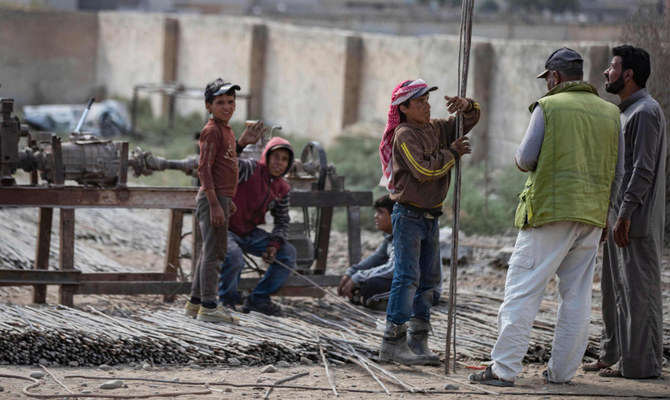BEIRUT: Amnesty International has urged Lebanese authorities to halt plans to return Syrian refugees to their country involuntarily.
The call follows Beirut’s announcement that it will start sending refugees back to Syria in batches this month.
Lebanon received around $5.83 billion in humanitarian aid between 2013 and 2018 specifically allocated for Syrian refugees.
Caretaker Social Affairs Minister Hector Hajjar said recently Lebanon did not need an international green light to return refugees to their home country, adding: “We are a sovereign country that makes its own choices and only informs the international community of its decisions.”
Hajjar is in charge of the repatriation plan, launched last month, in coordination with President Michel Aoun and the relevant Lebanese ministerial committee.
The plan aims to deport 15,000 Syrian refugees in cooperation with authorities in Damascus.
Aoun announced the start of the repatriations as of next week while also announcing Lebanon’s approval of the maritime border demarcation proposal with Israel.
The repatriation plan has previously been rejected by the UN over security and human rights concerns.
Lebanese authorities have dealt with the presence of Syrian refugees, who sought asylum in Lebanon 11 years ago on account of the outbreak of their country’s civil war, as an unwanted burden, and have asked the international community for funds to help.
Tensions have escalated to the point that Syrian refugees were recently accused of “consuming the bread allocated for Lebanese” against the backdrop of Lebanon’s three-year-long economic collapse.
Official figures for the number of Syrian refugees in Lebanon varies, with authorities estimating that there are more than 1.5 million refugees on their territory, while UNHCR states that the number of registered refugees is no more than 880,000.
Hajjar said Lebanon was keen on securing a safe return for Syrians currently taking shelter in his country, adding that requests for voluntary repatriation would be open for acceptance and that steps would escalate in the next phase.
The date for the repatriation of an initial 1,600 Syrian refugees depends on a decision issued by the General Directorate of General Security, which in turn awaits responses from the Syrian authorities so that repatriation procedures can proceed, said Hajjar.
Abbas Ibrahim, head of Lebanon’s General Security Directorate, said the resumption of repatriations would take place according to the same mechanism adopted previously, with lists of Syrian refugees applying for repatriation sent to Syrian authorities, who in turn grant security and judicial approvals for those allowed to return.
Thousands of Syrians in Lebanon fear a forced return to their country, though, with hundreds of families reluctant to make the decision, either because males are subject to compulsory military service in Syria, lingering worries over the legacy of the conflict, or because the areas from which they were displaced have witnessed opposition to the regime, making it unlikely they will be allowed to return home.
Syrian activist and refugee Abou Odai Amer: “Among 60,000 Syrian refugees in Arsal, 400 individuals want to return to western Qalamoun, which is the least affected region in Al-Qusayr and its surroundings.”
Amer clarified that registration happened 25 days ago through a lawyer in charge of legal repatriation.
These refugees had registered their names in previous repatriation convoys but they were not granted approval by the Syrian authorities.
Every one of them is now waiting Syrian approval, said Amer.
Diana Semaan, Amnesty International’s acting deputy director for the Middle East and North Africa, called on Lebanon to respect its obligations under international law and halt its plans to return Syrian refugees en masse.
She pointed out that international law prohibited constructive forced repatriation, which occurs when states use indirect means to force individuals to return to a place where they were at real risk of serious human rights violations.
The organization revealed that it had previously documented how Syrian refugees were subjected to torture, sexual abuse, forced disappearance and arbitrary detention upon their return to their country.
Semaan called on the international community to keep supporting the millions of Syrian refugees in Lebanon amid the escalating economic crisis in the country, to prevent further unsafe returns.
The Lebanese authorities “are scaling up the so-called voluntary returns ... when it is well established that Syrian refugees in Lebanon are not in a position to take a free and informed decision about their return,” Semaan added.
“In enthusiastically facilitating these returns, the Lebanese authorities are knowingly putting Syrian refugees at risk of suffering from heinous abuse and persecution upon their return to Syria,” she added.
The new repatriation campaign was welcomed by President Aoun’s Free Patriotic Movement.
FPM MP Georges Atallah called on Amnesty International to stand “against the violations to which Lebanon is subjected by being forced to keep the refugees on its territory.”
Independent MP Bilal Hoshaimi, though, warned of the danger of returning refugees in such an unsafe manner, with the absence of any international guarantees over their safety.


































